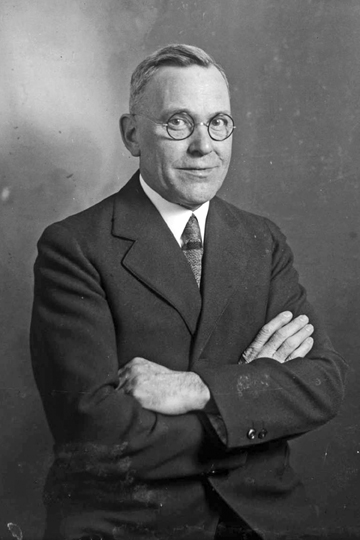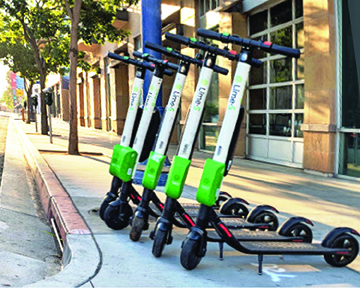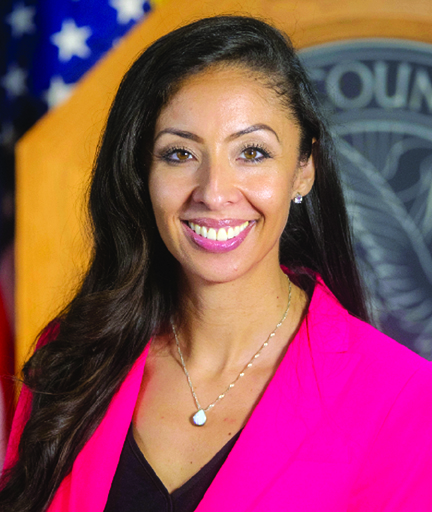
Floor Coverings by CPA




by Mark Smiley
In June 2019, a neighborhood group, Rename St*pleton for All, launched a campaign to change the name of the Stapleton neighborhood due to former Denver mayor Benjamin Stapleton’s affiliation with the Ku Klux Klan. On Monday, August 19, 2019, property owners overwhelmingly voted against the name change.

Of the 10,550 eligible voters, 3,590 people cast their vote, a 34% turnout. Sixty-five percent of the property owners around the land once occupied by Stapleton International Airport voted to keep the name which many felt was surprising due to the amount of publicity the name change had received. “I understand why people would want to change the name but, in the end, I voted to keep it as is because where does it end?” said Tara Johnson, property owner. “This is my neighborhood and I am proud of the name.”
“I was trained as an historian,” said Harold Scramstad in a statement to the Stapleton Front Porch. “If we start holding everybody in the past to the almost unreasonable standards that we’d set for ourselves, almost nobody is going to measure up. We should keep the name and invest it with all the qualities that we want a community to be — that 100 years from now, people will say, “Stapleton, that was the experimental community that really worked very hard to get it right.” Not, “There’s a community that in a smug or self-satisfied way thought it was solving its problems of the future by changing its name, because that didn’t really change anything.”
The Stapleton Master Community Association (Stapleton MCA) oversaw the election and indicated that the amount of voters nearly tripled the usual turnout. “We are disappointed and saddened by these results, but we are not especially surprised,” Rename St*pleton For All, said via Facebook. “Our work is not done. We love our neighborhood, and we invite all supporters to join us in doing the work to make our community one that truly welcomes and includes all.”
Stapleton served as mayor during the 1920s, ’30s and ’40s and appointed Klansmen to lead the police department and other city offices after his election to office in 1923 and to fight off a subsequent recall effort. But by 1925 he opposed the Klan and helped destroy its political influence in Denver and Colorado. “People seem to forget that Mayor Stapleton’s ties to the KKK were short-lived and he championed the eradication of them soon after he was elected,” said Tim Miller, property owner. “All of the good that Mayor Stapleton did seems to have been erased from history.”

The charge to change the name of the neighborhood dates back a quarter of a century. When the old airport was leveled in the 1990s and Denver International Airport opened, the neighborhood formerly occupying Stapleton Airport was named Stapleton. Backlash over the name dates back to this time and was revived in 2015.
Even though this name change was rejected by voters, the campaign has had an impact in other areas. In 2017 and 2018, the Rename St*pleton for All group was successful at having organizations drop the name Stapleton from their organization. The Stapleton Foundation became The Foundation for Sustainable Urban Communities, the former Stapleton Development Corporation now only uses the acronym SDC, and the Stapleton Citizens Advisory Board is now just the Citizens Advisory Board.
Those efforts have continued into 2019. Earlier in August 2019, Denver Parks and Recreation agreed to rename the Stapleton Recreation Center in Globeville, and this spring, the name of the Denver School of Science and Technology’s original campus changed from DSST Stapleton to DSST Montview.
Not all efforts of having organizations change their name have been successful. In May 2018, the SUN board asked Stapleton residents to vote on whether to change the RNO’s name from “Stapleton United Neighbors” to “Central Park United Neighbors.” A 66% vote in favor was needed and it fell short by eight percentage points.
The vote cast on August 19, 2019, needs to be ratified by the Stapleton MCA Board of Directors. Brookfield, the master developer has the ability to veto the board’s decision, but it is unlikely they will go against the vote.

“For an entire generation, Stapleton was an airport — it did not cause racial issues,” said Richard Caldwell in a statement to the Stapleton Front Porch. “It was the place the Space Shuttle landed on a 747; the Beatles, Nixon, and The Rolling Stones landed. We all lined the fences to watch planes come and go, people from all backgrounds and races — and we got along fine.”
For more information on the Stapleton MCA, visit www.stapletoncommunity.com.

by Marissa Smitton

Scooters have become an alternative to cars for many people, especially city residents with quick commutes. In 2018, Denver made over a thousand electric scooters (e-scooters) publicly available to citizens via companies such as Bird and Lime. Since, scooters are becoming an increasingly popular mode of transportation. With their increasing popularity lies a traffic jam and possible safety issues on sidewalks. Denver Public Works is considering a city ordinance that will ban e-scooters from sidewalks and allow them to be legally operated in the bike lane. This legislation has Denver citizens expressing polarizing viewpoints regarding where the scooters should operate. While some residents are in favor of scooters scooting left to the bike lanes, other citizens are opposed and offer their own safety concerns.
After reviewing citizens’ expressed opinions about the scooter program, Denver Public Works is considering the ordinance in an effort to increase the safety of people both on and off the scooters. With the recent influx of public scooters, insurance has had little time to catch up. “Currently, there is no mandatory liability insurance that e-scooter riders need to carry,” Daniel Foster of Foster Graham Milstein & Calisher, LLP informed Glendale Cherry Creek Chronicle. This leaves potential victims of scooter riders with little recourse to retrieve compensation for injuries.
This and other factors prevail while Denver Public Works carefully considers solutions. When speaking with the Chronicle, Public Works Chief of Staff Nicholas Williams expressed that, “the main benefit of this ordinance change is that it will minimize instances of scooter/ pedestrian conflicts.” Williams went on to say, “the most common complaint I receive from residents involves a scooter rider traveling at a high rate of speed and endangering a pedestrian.” E-scooters can reach a speed of 15 mph.

This isn’t the first time legislation has been proposed for the e-scooters. Former Denver Councilperson Mary Beth Susman sponsored the original bill banning scooters from sidewalks. Susman admitted she was unsure as to what this new ordinance offered but ventured a guess that it would “get rid of” the stipulation of the original bill that stated scooters could use sidewalks if posted speed limits exceeded 30 mph. This would seem to be the case, as the new ordinance proposes a total ban of e-scooters from sidewalks.
Most Denver residents who spoke with the Chronicle were in favor of the bill. Denver resident Carson Cameron expressed that scooters “clog up the sidewalks” and hinder accessibility for people who utilize wheelchairs. If scooter riders used the bike lanes, it would provide more accessible space to move around. This sentiment was echoed by fellow resident, Sarah, who also utilizes a wheelchair. E-scooters are technically still allowed on the sidewalk if riders are traveling less than 6 mph, and their use can limit available space for people with physical disabilities or limitations. In highly populated areas such as downtown and Denver University, this is a concern.
Another pro of e-scooters being relegated to bike lanes is that more citizens may be encouraged to ride their scooters, thus reducing car emissions such as smog and other air pollutants. This is the case for resident Jenn Vaught. “I would ride more,” Vaught responded to the Chronicle when asked about the ordinance. Car emissions directly impact the ground ozone level and reduce air quality. This affects everyone, particularly people who are older or have asthma or other breathing concerns. During summer months, air quality alerts frequently report moderate to unhealthy levels of air quality. E-scooters may not be appreciated on sidewalks, but safe operation in bike lanes may improve the air we breathe.
The ordinance should also ensure scooters remain in congruence with other transportation and vehicle laws, which is important to some Denver citizens. This was confirmed by Public Works Chief Williams who said, “it will simplify the rules of the road to mirror those of bicycles, which most people are already familiar with.” Resident Brenna agreed with the idea of scooter riders following similar laws to cyclers and voiced concern for people who operate the scooters intoxicated. If e-scooters were held to similar standards as other vehicles, then citizens can better understand the regulations of operating the transportation devices.

Not all Denver residents are in favor of scooter legislation and have their own safety concerns if e-scooters are permanently banned from sidewalks. Some Denver commuters are concerned that scooters will create even more traffic on already congested streets. A negative of the bill expressed by citizens is that strictly relegating scooters to bike lanes and roads may cause an increase in vehicle accidents. The scooters have been known to cause accidents and most recently, a person died in a scooter related accident on August 4, 2019. The victim, Cameron Hagan, was struck by a car while attempting to cross the street on a scooter. He marks the first scooter-related death in Denver.
Some citizens feel e-scooters may simply be too slow to keep up with traffic flow. But research shows this may not be the case. Bike riders average around 12 mph in city bike lanes, which e-scooters can exceed. This would mean that scooter riders can at least keep up with typical bike lane traffic flow. But some cyclers don’t want the extra traffic. “I just think it’s already too congested,” Denver resident Michael Lewis said. Michael expressed frustration when commuting around the Park Avenue area. “The scooters would only add to that,” he concluded.
E-scooter riders who litter pose another concern. Although leaving a scooter on the sidewalk unattended is not allowed, many people do it. It contributes to clogging up the sidewalks and hindering accessibility, mentioned prior. If scooter riders were banned from sidewalks permanently, there could be an increase of scooters left in bike lanes or in traffic, which again could lead to an increase of motor vehicle accidents.
While the ordinance to ban e-scooters from sidewalks is well-intentioned and for many, long overdue, other Denver citizens pose practical questions to the logistics of adding another transportation device to the bike lane. There are numerous positive aspects of riding e-scooters including but not limited to decreased pollution, and increased sidewalk accessibility. But there are also cons such as increased road traffic and increased accidents. Regardless of where individual Denverites stand, the consensus on both sides is safety first. The safety of citizens on the road should not be compromised for the safety of citizens on the sidewalk and vice versa. Citizens for and against the bill want to feel safe, and they want others to feel and be safe as well.

For the last eight-plus years the Denver City Council served no earthly purpose whatsoever. Thirteen individual council members drew six figure salaries, had gold plated health insurance and pension plans, along with expensive office space and assistants, but did absolutely nothing in return other than rubber stamp everything that a figure head Mayor and the high density developers who controlled him, put before them.

Citizens by the scores appeared before the City Council to beg them for relief from the depravations of the merciless business cartels such as the CEO driven and Orwellian named “Colorado Concern” and the rapacious “Downtown Denver Partnership” but to no avail. The City Council even decided, with the Mayor’s support, to essentially legalize (subject to state approval) heroin sales to all, including children, under the rubric of caring “safe injection sites.”
On the night of the second City Council meeting since the 2019 Spring municipal election there was nothing on the agenda which would cause the Mayor and his staff to expect anything but the normal supine behavior from the City Council that they had so long enjoyed. But on that night, however, newly-elected City Councilwoman Candi CdeBaca arose to object to utterly mundane contracts to two outside contractors who run halfway houses for approximately 500 convicts in the city. The money for the contracts was not even from Denver, but rather the State. CdeBaca objected to the contracts on the grounds that the contracts were with companies whose parent entities provided detention facilities for ICE, and the fact that she did not like for-profit companies making money off doing services which are normally performed by government.
She stated she did not expect support from a single other councilperson. To the shock of one and all, a majority of the Council supported her, and the contracts were canceled. The cancellations shook the political insider world of Denver. If a run-of-the-mill, non-controversial contract could be cancelled at the whim of a single councilperson, how safe are the literally hundreds of workie-workie contracts of the Mayor’s friends and city lobbyists? Is anybody’s piece of the municipal corporate gravy train safe?
After that meeting came the equally shocking proposal by Council President Jolon Clark of a $43 million carbon tax on businesses to fund, inter alia, a city climate change office. Clark and his six Council co-sponsors are a majority on the 13-person Council. The Mayor and his lackies at the bought-off Denver Post, howled. How dare Clark act as if the City Council was a democratically elected legislative body. Notwithstanding the protestations, the Finance and Governance Committee approved passing on the proposals to the full Council by a 4 to 3 margin with CdeBaca, Hines, Gilmore and Clark voting in favor and holdovers, Ortega, Kniech and Black voting against.
As a practical matter we don’t support either the cancellations of the halfway house contracts or the carbon tax on businesses, the latter of which has to be approved by the voters even if passed at the Council level. But far more important to us than the actual merits of these actions is the fact that a majority of the City Council are no longer willing to act as a doormat for a corrupt Mayor and his backers. We are hoping that the new majority will also oppose the rape of Park Hill Golf Course by Westside Investments, LLC., and the destruction of the Elyria and Swansea neighborhoods by the ill-conceived and unbelievably corrupt I-70 expansion, along with hundreds of other projects designed to destroy what was once a truly beautiful city and its neighborhoods.
Is it possible that representative democracy is returning to the Mile-High City at long last? We certainly hope so.
